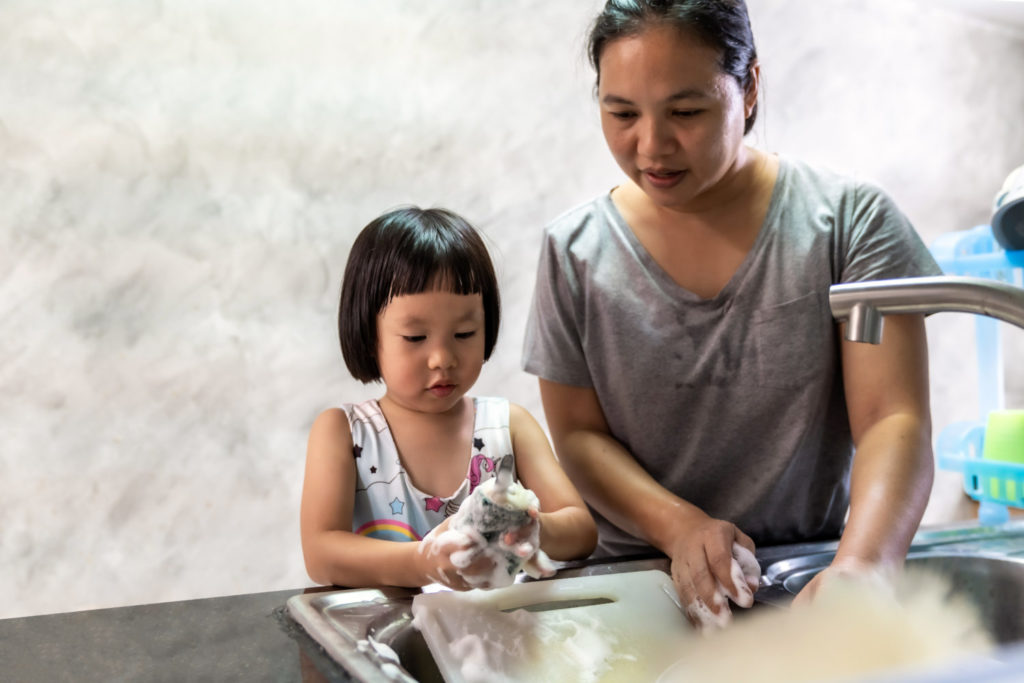How Chores Make Kids Resilient

I have many fond memories of baking with my grandmother. A rolling pin was too hefty for my little hands, so she’d give me a small piece of dough and a round clothespin, and together we’d roll out our crusts. I loved learning with her. She was a great pie baker, and now I am, too. I’m a grandmother myself now, but the smell of cherry pie still brings me vividly back to the comfort of my own grandmother.
These foundational experiences of connection are more than just happy memories; they actually tap into a biological mechanism that sets children up for better heart, brain, and gut health, immune response, emotion regulation, stress resilience, and social skills. This mechanism is built into all of us (adults, too!). It can be turned on at will and it literally helps you live longer. Essentially, you and your kids have a superpower.
This superpower is called autonomic co-regulation: our autonomic nervous systems pair with each other and calm down together. The process is simple: we engage in activities that stimulate our five senses while connecting emotionally with someone we love. That kick-starts a cascade of hormones that allow our physical and emotional body to thrive, right down to the cellular level.
It’s a practice: making co-regulation a regular part of their routine helps us and our children react less strongly to stressful events, and return to calm faster. Stress resilience is a key indicator of overall health and longevity, and we have the power to increase it simply by connecting with people we love. The research tells us that learning this skill early has measurable impacts on healthy development, school performance, and emotion and behavior regulation.
But we’re all busy, and carving out dedicated time to co-regulate might sound overwhelming. That’s why activities we already do—like cooking and laundry—are an excellent time to connect! Sharing chore responsibilities with kids offers an opportunity for them to learn, love doing the chore, and feel confident and appreciated. Studies have shown that starting chores at an early age (3 or 4 years old, or even before) might be the single best predictor of success as a young adult, in terms of school, career, and relationships.
If we make chores activities of connection, we can turn the mundane into something meaningful, while protecting our children’s futures. A chore doesn’t have to be something that just needs to get done. It’s all a matter of intention: we can fold laundry next to each other in silence or alone, neither of which is fun, or we can turn it into a feel-good, health-promoting practice. When we make chores fun, children become conditioned to see the experience through that lens. Ask a child to do a chore alone, and you’ll get a lot of opposition. But if you make it funny, sing a song about how gross the garbage smells, make it a game or competition, they’ll enjoy the connection and learn to value the give-and-take of cooperation.
Children may also be at their most unselfconscious while engaged in a joint activity, and when they’re relaxed in this way, they’re more talkative and receptive. So kneading dough together, or gathering up dirty clothes while dancing to their favorite songs can actually provide wonderful opportunities for your child to share their innermost thoughts and feelings, and for you to offer support while they’re in a state of openness and connection.
Here are some tips for building resilience through these everyday activities:
Kids love to feel helpful and included, and they love to learn.
Cooking
- Almost anyone is old enough to stir. Even a baby can be given a bowl and spoon to play with on the floor while you mix ingredients.
- If your recipe calls for sliced potatoes but your child is too young to use a knife, have them bring you the potatoes—use it as a chance to practice counting!
- Explore sensations together: “Taste this soup: does it need more salt?”
- Pouring is fun—if they spill, no big deal. Turn the clean-up into a joint activity.
- Set the table together—use bright napkins and practice their colors. If your child is old enough, make it a game: who can come up with the most creative place setting?
Laundry
- Doing each other’s laundry is usually a more successful routine than having kids do their own laundry. It gives them an opportunity to help and be appreciated, rather than isolating them. They can learn the skill of doing laundry in the context of supporting their family.
- Invite them in! Your child would probably much rather play with you right now than have to wait until you’re done folding laundry—so if folding needs to get done now, why not make it a time to share a connected experience?
- If they’re too little to fold larger articles of clothing, they can fold dish towels or napkins (I folded washcloths with my mother as a child, and I enjoy it to this day because it was a meaningful activity for me).
When we find daily opportunities to co-regulate, we give our children the gift of better emotional processing and behavioral skills, heart, brain, immune, and gut health, and calming, gratifying connection in their foundational relationships. Did we mention these health benefits extend to adults, too? Something as simple as daily chores—when we engage in them together—makes us and our children calm, healthy, and resilient.
